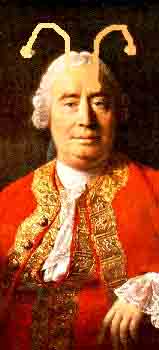
His quirky genius is at its best in his Enquiry Concerning Human Understanding, a treatise in which he undertakes to account for everything that can be known so that we can ignore all the other stuff. To establish his case in this book, Hume needs to convince his readers that we cannot actually know that things are caused. You may see event A occur and then see it followed by event B, but what you did not see, and couldn’t possibly see, was some ghostly thing called “causation.” The modest knower, Hume says, would restrict himself to affirming that B followed A, rather than risking the unprovable hypothesis that A caused B.
But wait, you object. It’s not just that B followed A, but that B followed A a billion times. I knock a billiard ball into another one with this amount of force, and the second billiard ball always always always moves. Sure, admits Hume, and you should feel free to draw the causal inference that that’s what will happen next time you do it. But you don’t know that it will happen, because you didn’t observe causation. You observed billiard balls. You observed a correlation of events, but not a link. So just settle down and describe what you saw, not this highly speculative “cause” thing.
Convincing readers to put causation itself into a “maybe/maybe not” category is quite a stunt. I don’t think Hume succeeds, but I won’t go into that here. In the Enquiry, he doesn’t draw all the irreligious conclusions that he could from his line of argument, except for the influential part that critiques miracles. What I find most interesting in the causation arguments of the Enquiry is the sheer imaginative feat of suspending belief in cause. Is it really even psychologically possible to do that? If you’ve ever walked into a room, flipped the light switch, and been startled to hear the phone or doorbell ring at that exact instant, you might have experienced a momentary rush of confusion over which event you caused. But the force of convention kicks back into place pretty quickly, and you remind yourself that since the switch activates only the light, the sound was a coincidence. Hume argues mightily that the initial disorientation of this moment is a key to the sober interpretation of how events relate to each other.
My favorite passage in the Enquiry is a section where Hume pretends to be the proverbial man from Mars who just got here and is making sense of everything from scratch. But, characteristically, Hume pushes way past the Martian observer. He describes an imaginary observer who comes from a much crazier place, a place where nothing ever happens predictably:
It seems evident that, if all the scenes of nature were continually shifted in such a manner that no two events bore any resemblance to each other, but every object was entirely new, without any similitude to whatever had been seen before, we should never, in that case, have attained the least idea of necessity, or of a connexion among these objects. We might say, upon such a supposition, that one object or event has followed another; not that one was produced by the other.
In such a world, we would have to admit that “The relation of cause and effect must be utterly unknown to mankind. Inference and reasoning concerning the operations of nature would, from that moment, be at an end; and the memory and senses remain the only canals, by which the knowledge of any real existence could possibly have access to the mind.” Hume’s conclusion from the thought experiment is that
Our idea, therefore, of necessity and causation arises entirely from the uniformity observable in the operations of nature, where similar objects are constantly conjoined together, and the mind is determined by custom to infer the one from the appearance of the other. These two circumstances form the whole of that necessity, which we ascribe to matter. Beyond the constant conjunction of similar objects, and the consequent inference from one to the other, we have no notion of any necessity or connexion.
Well, I suppose that might be true in a world so constituted. In this actual world we’re living in, of course, we have an overwhelming amount of predictability, and I suppose a Chestertonian spin on Hume would say we should all walk around this world every day astonished that B keeps following A time after time. And if we can’t manage astonishment, we should at least be grateful –again, that would be Chesterton, not Hume. It’s not clear to me who Hume would say thank you to, based on his overall religious outlook. But reading Hume is a great wake-up call when you start taking too much easy knowledge for granted, and I’m grateful for that.
I’m also grateful for the wacky thought project of trying to imagine a world in which “no two events bore any resemblance to each other, but every object was entirely new, without any similitude to whatever had been seen before.” Whoa.